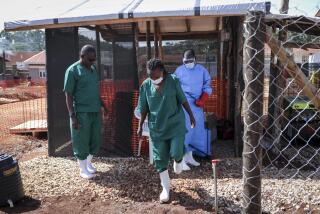U.S. Seeks AIDS Test of All Students at Big University : Koop Sees No Invasion of Privacy
- Share via
LONDON — U.S. Surgeon General C. Everett Koop said today that he wants to screen every student of a major American university this spring to help determine the incidence of AIDS among young adults.
Koop also proposed similar mass AIDS screening at a few high schools in the United States but said the government had made no decision on either proposal.
He disclosed the plan at a world meeting on AIDS in London and gave details in an interview today with the Associated Press.
Koop’s plan for anonymous screening of students could prove controversial. Civil libertarians have argued that anonymous screening is an invasion of privacy and that screening of a limited population could be the forerunner of mandatory nationwide testing.
No University Selected
The surgeon general said that health officials had yet to choose a university but that it would likely be one in a large city with a student body of around 25,000. Plans call for the screening to take place some time this spring, Koop said, and it would likely be part of a one-day, open-air campus gala on AIDS prevention.
“The goal would be to test everybody in that university in such a way that it’s done out in the open, above-board; everyone knows that the blood specimen is not in any way tagged,” Koop said.
“That would give you a pretty good idea of the prevalence (of AIDS) in the age group in an urban setting,” he added.
The incidence of acquired immune deficiency syndrome is highest among 20- to 24-year-olds, with male homosexuals and drug abusers among those most at risk.
How AIDS Is Spread
AIDS is caused by a virus that damages the body’s immune system, leaving victims susceptible to infections and cancer. It is spread most often through sexual contact, needles or syringes shared by drug abusers, infected blood or blood products, and from pregnant women to their offspring.
Blood tests can determine the presence of AIDS antibodies, indicating exposure to the virus, but a positive test does not necessarily mean that a person will develop symptoms.
Koop said the screening would probably be conducted under the auspices of the Centers for Disease Control in Atlanta or the American Medical Assn.
He said anonymity would be guaranteed and those taking part would have no way of knowing the results.
‘Not Invasion of Privacy’
“To me, it’s not an invasion of anyone’s privacy,” he said. “It’s an effort to help the public health people make some predictions about prevalence, which we sorely need.”
Koop said he also hoped that such screening could be carried out at a few high schools in diverse parts of the country. As examples of the types of places he had in mind, Koop cited Philadelphia or New York’s South Bronx in the Northeast and Evansville, Ind., in the Midwest.
The CDC earlier dropped a plan for random testing in the United States after surveys found that 40% of the people would refuse to take part.
Test Not Mandatory
Koop said he would like to test an entire university student body, and possibly the faculty, but acknowledged that some people might not want to take part, indicating such screening would not be mandatory.
The three-day conference, attended by health ministers from 114 countries and senior public health officials from 34 others, adopted a declaration backing the World Health Organization’s global strategy on AIDS control and prevention. The strategy calls for slowing the spread of AIDS in every country by using educational and scientific means to attack its modes of transmission.
More to Read
Sign up for Essential California
The most important California stories and recommendations in your inbox every morning.
You may occasionally receive promotional content from the Los Angeles Times.












